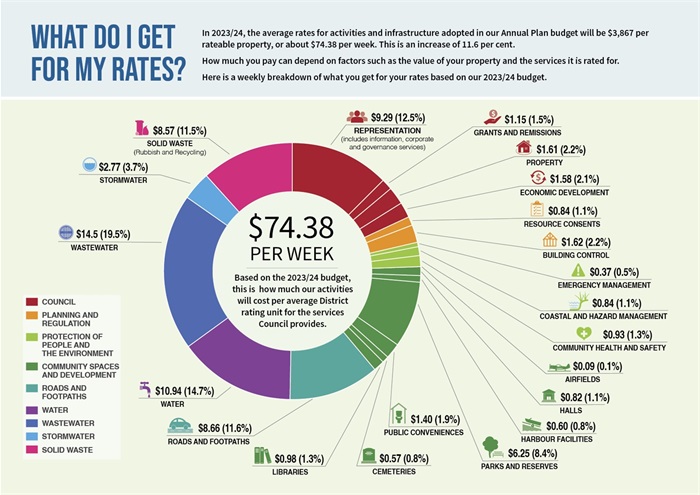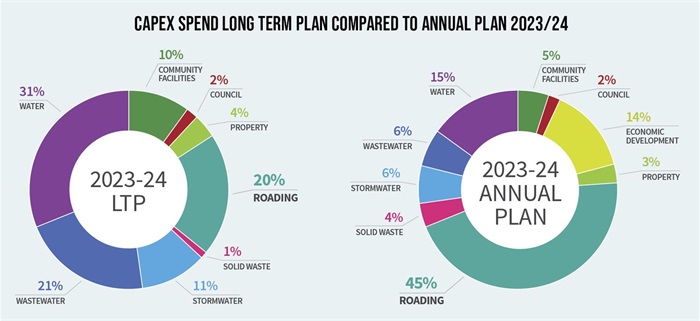The final Annual Plan was adopted at our Council meeting on 27 June 2023. The Plan sets your rates for the financial year and also outlines the services, infrastructure, facilities and budgets, how these costs will be funded, and how this differs from what we proposed for the year in our Long Term Plan (LTP) 2021-2031.
“It was a challenge to strike just the right balance between what we’re delivering as a Council and the cost of services our communities want and expect – especially when the cost of delivering those services is increasing,” says our Mayor Len Salt.
Like many councils around Aotearoa New Zealand, we’re also grappling with escalating costs for freight, materials, fuel and labour, making our capital works projects more expensive to deliver.
We’ve set the average district-wide rates increase for the 2023/24 financial year at 11.6 per cent – a small increase on the 11.4 per cent that we forecast in our consultation period back in March/April this year. We’ve achieved this by cutting our operational costs, revising our capital works budget, and deferring some of our non-roading projects. We’ve also used retained earnings – which are generated when our operational budgets have been underspent – to soften the rates increase by three per cent.
The rates increase will vary depending on factors such as the services offered in your area and the type of dwelling. Please consult page 56 of our Annual Plan(PDF, 3MB) to see the rates increase for your community service area.
“The road to recovery may seem daunting at times, but we’ll continue to advocate for ongoing central and regional support as we move through the recovery phase,” says our Mayor Len.
“We’ll also prioritise climate change in our long-term planning, with community and iwi input, ensuring that we deliver stronger, more resilient infrastructure so our communities are well placed to adapt to the challenges ahead.”
Read our final Annual Plan(PDF, 3MB) and catch up on the highlights below.

Highlights of our 2023/24 Annual Plan

2023/24 rates increase: Our proposed average district-wide rates increase for 2023/24 was forecast two years ago in our LTP to be 7.7 per cent. After considering feedback from submissions and our Community Boards, and the addition of storm recovery projects, a small adjustment resulted from our proposed 11.4 per cent, to 11.6 per cent. For a weekly breakdown of what you get for your rates based on our 2023/24 budget, see the graphic above.
Operational works programme: Our operational expenditure (OPEX) programme funds our Council’s day-to-day activities and services. We made some cuts and removed $2.9 million from our OPEX programme to make the rates increase more affordable for our ratepayers. We’ve also redirected the allocation of Community Board grants funding by removing contestable funding and increasing the level of discretionary funding across our wards, making a saving of $160,500.
Capital works programme: Our capital expenditure (CAPEX) programme is spent on constructing or upgrading assets such as infrastructure, equipment or buildings. With local government inflation forecast to be 11 per cent for 2023/24, we’ve had to add an additional 4.8 per cent to the costs of all our projects and services. Our LTP for year three had a forecast budget of $54.7 million, and we’ve revised that down to $50.5 million. We’ve also added $14.6 million of new roading projects to address immediate concerns with storm recovery, and we’ve deferred or reduced the scope of some existing projects for the 2023/24 financial year. This need for project reprioritisation is occurring nationally and isn’t unique to our district.
The graphic below demonstrates revisions in our 2023/24 CAPEX budget to make room for storm-related road works, compared to what we forecast for year three of our Long Term Plan.

Kerbside collection pricing: As our current solid waste contract finishes on 31 August 2023, we began planning in 2021 for the procurement of a new contract. In March/April 2022, we consulted with our communities on organic collection options and, in response to community feedback, decided to include a weekly food waste collection. After a robust tender process, we awarded the contract to Waste Management New Zealand Ltd in September 2022, to begin on 1 September 2023. We asked for your feedback on three pricing options for the new wheelie bin pre-paid system (to replace the blue pre-paid Council rubbish bags) and targeted rate, and the recommended Option 2 has now been adopted. This is a ‘Pay As You Throw’ (PAYT) pre-paid system costing $8 including GST per 140L bin empty and a targeted solid waste rate increase (for those in an area of service) of 76 per cent.
Fees and charges: Some fees and charges have been adjusted to help us keep up with the costs of delivering our services. These included the PAYT pre-paid system for kerbside rubbish collections, solid waste bin replacement fees, Refuse Transfer Station fees, changes to fees for building and resource consents, development contributions, water usage and the ‘learn to swim’ fee at Thames Centennial Pool. Library fines were also removed from our district libraries.
More information